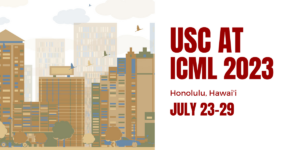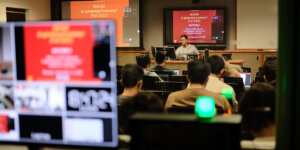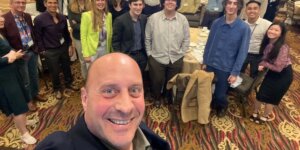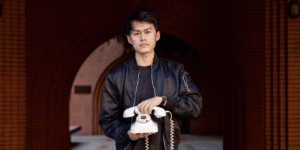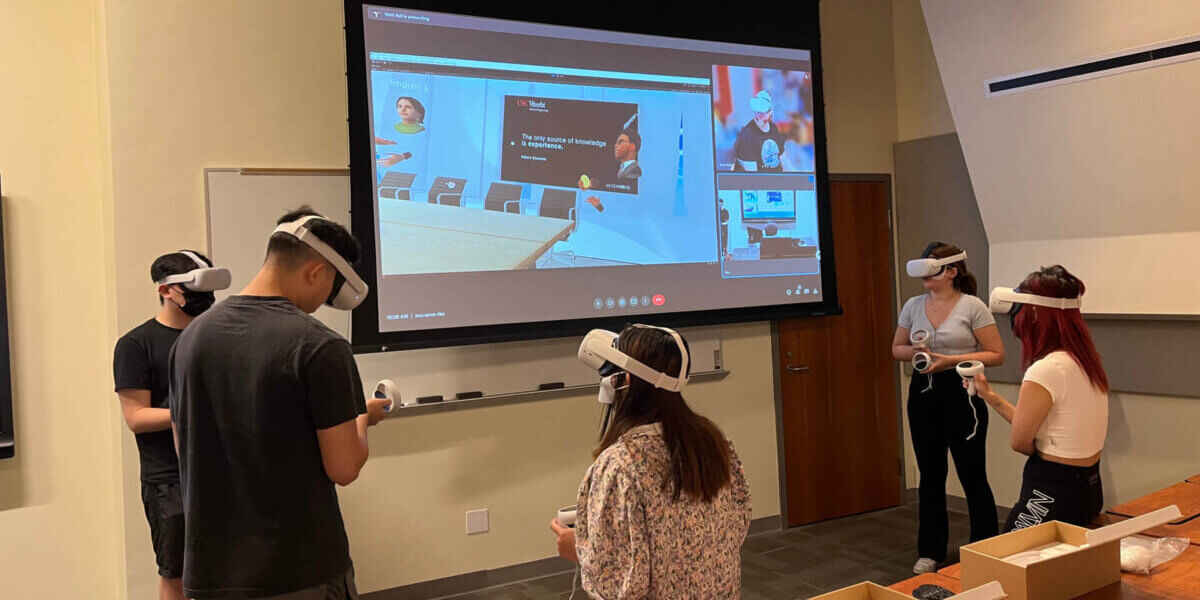
STUDENTS PARTICIPATE IN A VR EXERCISE IN PROFESSOR ELISABETH ARNOLD WEISS’S WRITING 340 CLASS (Photo/Courtesy of Elisabeth Arnold Weiss)
In the middle of a white, clean board room floats a wide parachute with strings that holds a collection of props: a broom, a tricycle, a drum and a slice of chocolate cake. A hand reaches out to grab the chocolate cake while the observers ask: what is this chocolate cake? Where is this room?
The answers are “anything” and “anywhere.”
In Elisabeth Arnold Weiss’s Improv for Engineers sessions, which are a part of her advanced writing course, students use virtual reality to visualize and empower their imagination in improv exercises.
“[VR] is a facilitator. It’s an accelerator,” said Weiss, an associate professor of technical communication practice at the USC Viterbi School of Engineering. “It’s something that can go right to the heart of the learning faster.”
Just a decade ago, Weiss introduced improvisation to her advanced writing for engineers’ course, Writing 340, by partnering with Hollywood comedians and improv theater faculty from the USC School of Dramatic Arts to deliver improv exercises where students learn how to become more effective and confident communicators.
Now, she has added another twist to the improv sessions. Beginning in fall 2022, Arnold Weiss injected VR into them. She did so because she believed “engagement and experimentation were the best way for engineers to learn,” even when it comes to learning soft skills.
“Teaching and learning in the traditional classroom can become procedural and transactional,” she said. “But when we get into this virtual space, there’s something different.”
VR and improv
During Weiss’s improv sessions, eight students don headsets and enter the VR, participating in fast-paced activities that cultivate innovation, forward-thinking and even communication crisis management. Meanwhile, the rest of the class watches the interaction on a live broadcast, waiting for their turn with the headset.
“Even the instructors, we don’t have a pre-determined expectation. You know it’s designed to open things up. Not shut them down,” Weiss said.
Students love it.
Leyu Xu, a senior computer science games student, said he really enjoyed pitching products to classmates and learning how to navigate through the unearthly physics of the VR environment.
“The introduction of VR really expands the spatial boundary of the class and releases the students from the confines of the classroom,” Xu said. “It helped me imagine how to communicate in a professional setting and boosted my courage to communicate despite my fear of the audience.”
Why VR?
A self-described “tech evangelist,” Weiss believes in the power of technology in “enabling human potential.” As an engineering educator for nearly three decades, she read several studies about the benefits of VR before deciding to add it to her classes. During the pandemic, she came across a research paper describing how video-chatting communications enhanced productivity but diminished creativity. She decided to turn to VR to harness this digital productivity while solving the limits on creativity.
“VR is a tech medium yet it’s so alive and intimate, which is counterintuitive to how we view technology as cold and inhuman,” Weiss said.
Weiss had been following the development of VR since 2016. However, it wasn’t until she spoke with her then-mentee, Leon Huang, B.S. ’19, that she realized the potential of VR to transform the education space.
Huang was a visually impaired student studying computer science games. The Singaporean military veteran brought a laptop to class equipped with different accessibility tools to help fill in information he might miss. Weiss realized it was a challenge for him to maneuver between desks, chairs, and students inside the physical classroom, which made it awkward for him to actively participate in the improv exercises. Weiss’s desire to help her student better participate in the improv exercises, coupled with a growing curiosity in the development of VR, led her to ask Huang a single question: “What do you think of bringing VR into this classroom?”
His response: “Yes, please!” Not only did Huang’s answer give voice to the most extreme desire of students to find more engaging ways of learning, but it also served as proof of concept for Weiss: VR in the classroom could improve accessibility and participation.
Professor Weiss in action
In 2021, Weiss decided to move forward with VR, even though she had no funding at the time to buy the equipment.
Through a grant from the Engineering Information Foundation, a New York-based engineering education improvement group, Weiss received $24,500 to build a custom VR space and purchase a virtual headset.
She next reached out to INTERVRSE, a Silicon Beach-based startup that creates immersive metaverse experiences. It was important, Weiss said, to work with a company that was not only local and available but also flexible, nimble and respectful of the educational goal. INTERVRSE designed five custom virtual settings: Campus Landing, Boardroom, Future Classroom, Theater, and Hotel Lobby. Each of these spaces had customizable features, which means students had access to infinite environments and contexts.
Weiss piloted VR in three improv sessions, taught by Debra De Liso and Paul Hungerford of the School of Dramatic Arts, in her advanced writing classes in fall 2022. The results have exceeded her expectations. Students, Weiss said, are much more engaged in exercises and bold with their creativity. She attributes this to how VR lowers perceived barriers to communication.
“It’s almost like people leave their inhibitions at the door because it’s virtual,” Weiss said. “You’re a little bit untethered from your own identity, your own self-consciousness, your own fear of judgment. It’s a freeing space. You have more of a free flow of ideas.”
Added Steve Bucher, director of the Engineering in Society Program: “Finding ways to innovate within a writing curriculum can be challenging and using theater improvisation offers many opportunities for creativity and exploration for engineering students. Elisabeth’s use of VR as a way to enrich this experience is a great way to expand its impact.”
Weiss hopes that USC Viterbi continues its exploration of VR to provide a basis of educational experiences for other institutions in the future.
“This expands our current boundaries of experiential learning,” she said. “It’s the spot which I feel is really ripe for having very intense, effective learning experiences.”
Published on November 22nd, 2022
Last updated on November 28th, 2022




